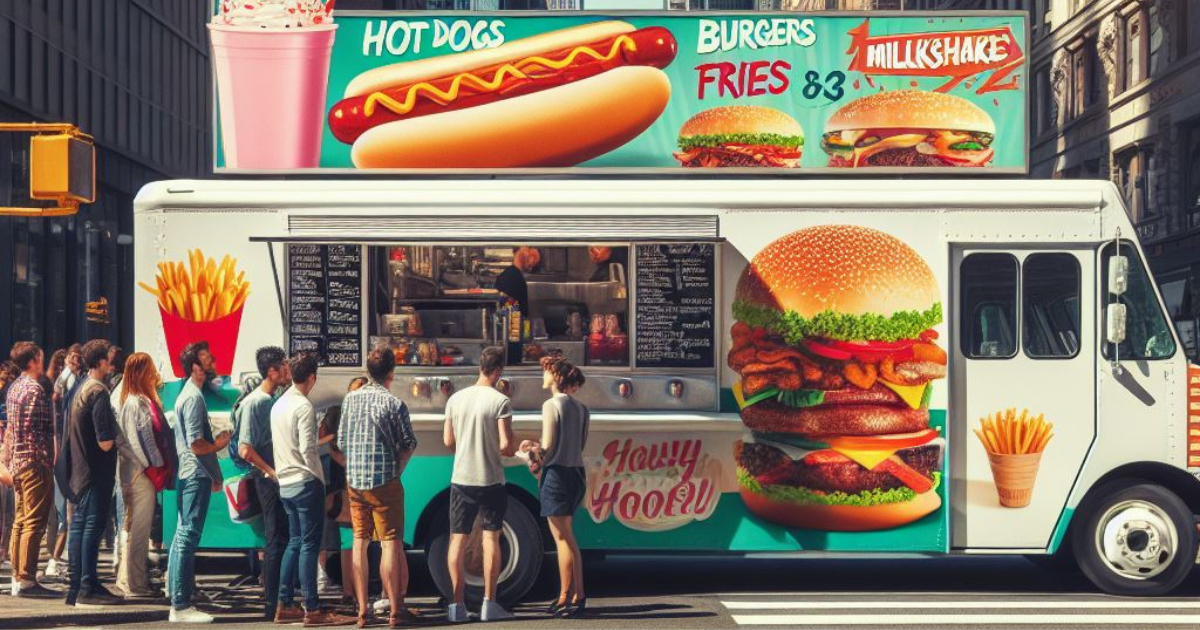For those who want to start their own business, a food truck could seem like a great idea. Nonetheless, a lot of entrepreneurs observe that operating a food truck can require more resources and be more difficult than operating a conventional brick-and-mortar restaurant. In addition, there are several California food truck licensing rules and regulations that need to be followed to prevent expensive legal disputes or the closure of businesses. Additionally, you need insurance, such as California food truck insurance, to shield your company from liabilities.
Why start a food truck business?
In recent years, the food truck industry has grown significantly in popularity. There are 36,324 food truck enterprises operating in the United States as of 2023, up 9.9% from 2022—and the number is still rising. The capacity of food trucks to offer clients quick, varied, and excellent meals in a variety of settings is what drives demand for them.
Compared to conventional brick-and-mortar restaurants, food trucks have several advantages. Here are a few advantages of beginning one:
California Food Truck Costs, Profits & More
| Feature | Minimum Cost Estimate | Notes |
| Truck purchase (new/used) | $30,000/$15,000 | Varies greatly depending on size, features, and condition. |
| Permits & licenses | $5,000 | State and local fees can vary. |
| Insurance | $2,000/year | Liability and vehicle insurance required. |
| Equipment & supplies | $10,000 | Cooking essentials, storage, utensils, etc. |
| Inventory & ingredients | $5,000 | Varies based on menu and daily operations. |
| Marketing & promotion | $1,000 | Website, social media, event fees, etc. |
| Total minimum cost | $53,000 | This is a starting point, actual costs may be higher. |
Benefits of California Food Truck
- Start with less: Lower investment compared to restaurants, quicker testing of concepts.
- Roam & Rule: No fixed location, access diverse events and maximize customer reach.
- Culinary Canvas: Freedom to experiment, cater to niche markets, stand out in the crowd.
- Community Cravings: Build close relationships with customers, foster loyalty and repeat business.
- Life on Your Terms: Flexible schedule, be your own boss, achieve work-life balance.
- California Sunshine: Diverse population, thriving food culture, year-round outdoor events fuel culinary success.

Steps to Start Your California Food Truck
1. Chart Your Course
- Market research: Discover your target audience, analyze competitors, and assess the food truck landscape.
- Concept creation: Craft a unique menu and brand identity that resonates with your customers.
- Business plan: Outline your financial projections, marketing strategy, and operational roadmap.
2. Secure Your Paperwork
- Licensing: Obtain essential permits from the state and local authorities, including health department approvals.
- Insurance: Protect yourself and your business with liability and vehicle insurance.
- Tax registration: Register your business with the state and federal government to comply with tax obligations.
3. Find Your Ride
- New vs. Used: Decide between purchasing a new food truck or renovating a pre-owned one, considering budget and customization needs.
- Kitchen on Wheels: Ensure your truck meets health and safety regulations with proper equipment, ventilation, and food storage.
- Branding Power: Design eye-catching visuals and signage that reflect your brand and capture attention.
4. Fuel Your Operations
- Essential Equipment: Invest in reliable kitchen tools, food containers, and utensils for smooth operations.
- Inventory Management: Master the art of stocking ingredients to avoid waste and ensure availability.
- Food Safety First: Implement strict hygiene protocols and safe food handling practices to protect your customers and brand.
5. Spread the Word & Win Hearts
- Digital Delights: Build a strong social media presence, create a website, and explore online ordering options.
- Community Connections: Participate in food truck festivals, collaborate with local businesses, and network with event organizers.
- Promotional Savvy: Offer specials, loyalty programs, and engaging content to attract and retain customers.
Bonus Tip Network with other California food truck owners! Gain valuable insights, mentorship, and support from experienced entrepreneurs.
California Food Truck Dream Pros & Cons

Pros:
- Lower investment than restaurants
- Location flexibility for diverse customers
- Culinary creativity and niche market potential
- Strong community connections and repeat business
- Be your boss with a flexible schedule
- Thrive in California’s diverse food scene and events
Cons:
- Long hours and physically demanding work
- The competitive landscape requires a unique concept
- Weather dependence can impact income and flexibility
- Complex regulations and permits to navigate
- Limited space and resources require adaptation
- Regular maintenance and potential downtimes
Important Rules and Requirements For Food Truck Businesses
Compared to restaurants and other food retail operations, food trucks are subject to different legal difficulties. As a result, regulations designed specifically for food trucks specify how they must operate. The following are some of the most important legal concerns and rules you should be aware of before launching your food truck business; the list is not exhaustive.
Permits and Licenses
The following licenses and permits are required in California to lawfully operate a food truck:
- Business license: To conduct lawful business in a particular city in California, all businesses must get a business license.
- A portion of sales or an annual charge would be needed for this. If you have employees, you will also require an Employer Identification Number (EIN).
- Vehicle license: Just like with any other vehicle, your truck requires a license. It’s possible that a business driver’s license is not required.
- Food handling permit: In certain places, obtaining permission and/or enrolling in a food safety course are required. When your food truck is operating, someone with this type of permit needs to be there at all times.
- CA reseller permit/seller permit: If you are selling food, you must have reseller permission if you are selling someone else’s pre-made items, and a seller permit if you are selling your goods.
- Permit from the health department: The health department in your area will conduct health inspections of your food truck. To ensure that local authorities are monitoring the hygiene and food safety of your vehicle, this permit is required.
You Might Also Like
Small business ideas from Home for Ladies Top 10 Trending ideas
How to start a small business: Get in the Right Mindset
How to Promote an E-commerce Store on a Budget 2024
What is a Korean corn dog? Tips for making the best Korean corn dogs
California Food Truck Dream: FAQs
How much does it cost to start a food truck in California?
Minimum costs can range from $53,000 to much higher depending on factors like truck purchase, permits, equipment, and inventory. Research thoroughly and create a detailed budget.
What permits and licenses do I need?
Requirements vary based on location. Typically, state and local health permits, mobile food facility permits, and business licenses are necessary. Consult the California Department of Public Health and your local authorities for specifics.
Is there a lot of competition?
Yes, California has a vibrant food truck scene. Stand out with a unique concept, effective marketing, and delicious food.
How much can I potentially earn?
Profits depend on sales, margins, and operating costs. Expect average margins of 15-20% and daily sales ranging from $500-$1,000. Remember, success requires hard work and smart planning.
What are the biggest challenges?
Long hours, competition, navigating regulations, limited space, and weather dependence are key challenges. Dedication, adaptability, and passion are crucial for success.
What resources can help me get started?
The California Department of Public Health, National Food Truck Association, and Food Truck Empire provide valuable information and resources. Connect with other food truck owners and network for support and insights.
Do I need experience in the food industry?
While experience helps, passion, a strong work ethic, and a willingness to learn are essential. Consider partnering with an experienced chef or taking relevant courses.
I am a Blogger, SEO |Content Writer. With a passion for exploring the dynamic landscape of the Gulf Era. With a keen interest in business, lifestyle, and digital advancements in the region, brings insightful perspectives and comprehensive knowledge to readers. Stay updated with the latest trends and developments in one place!
Join me on my journey to understand the ever-changing Gulf region through the lens of business, lifestyle, and Solutions.
